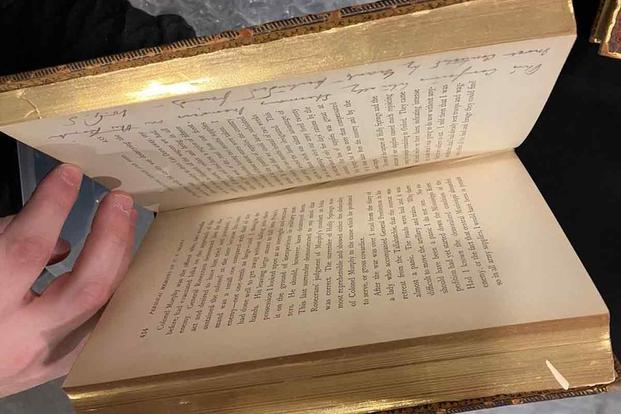COLUMBUS, Ohio — Adam Fleischer, a Columbus auctioneer, was searching through artifacts from Civil War Union General William T. Sherman’s descendants’ home, cataloguing them for potential sale, when an assistant called him into the other room.
The assistant, rare book specialist Danielle Linn, had discovered a handwritten inscription in the margins of another famous Ohioans’ biography, where former President Ulysses S. Grant had described his decision to not pick Sherman for a particular command job because of Sherman’s recent “failure” in another assignment.
“It was no failure at all,” Sherman had written, underlining the words for emphasis.
Fleischer had boxed up the memoir and other items, including Sherman’s personal sword and military trunk, his family Bible and other mementos, driving them from a Sherman descendant’s home in western Pennsylvania to to his office in Columbus. And next month, that’s where he will auction them off, along with dozens of other Sherman-related artifacts.
“They’ve venerably preserved everything over the last 150 years,” Fleischer said. “It was literally sitting in their attic and in the family estate’s library. It was just time for it to go.”
Sherman is one of Ohio’s most famous historical figures, coming from a politically prominent family. His father, Charles, was a former Ohio Supreme Court justice. His older brother, Charles Taylor Sherman, became a federal judge, while his younger brother, John Sherman, helped found the Republican Party and was Ohio’s longest-serving U.S. senator.
After being born in and growing up in Lancaster, east of Columbus, William T. Sherman joined the U.S. Army, graduating from West Point in 1840. He accepted posts around the country and later entered business, including in San Francisco, California and St. Louis, Missouri.
After the Civil War broke out, Sherman was commissioned as an officer in the U.S. Army. He eventually gained the trust of then-President Abraham Lincoln and Grant, who had risen to be the commanding general of the Union Army. Sherman eventually was promoted to major general.
Sherman is best known historically for his “March to the Sea,” an 1864 military campaign in which forces under his control burned Atlanta and other southern cities as part of an effort to end the war by breaking the South’s public morale. He ended up replacing Grant as the General of the Army, a rank only held by three people, after Grant was elected president in 1869.
In an interview in his Columbus office, Fleischer said that Sherman continues to draw public interest today, gaining respect from people who abhor modern displays of sympathy toward the confederacy and notoriety from southerners who resent his harsh military campaigns.
He said while his March to the Sea is controversial today, it also helped ensure the North won the Civil War since its success helped Lincoln win reelection in the 1864 presidential election over George McClellan, a former top Union general whose Democratic Party officially supported negotiating an end to the war.
“He’s an important figure in so many different ways,” he said.
Fleischer estimated the entire collection could fetch at least several hundred thousand dollars in total. It will be auctioned publicly on Tuesday, May 14. The proceeds will go to Sherman’s family, which found Fleischer through a reference provided by the Gettysburg Museum in Pennsylvania. Fleischer, who started his auction house four years ago, has past experience auctioning Civil War artifacts through his larger specialty, which he said focuses on 19th-century Americana items.
As of the writing of this article, some of the items in the Sherman collection with the highest preliminary bids include Sherman’s sword and trunk ($16,500), his general’s rank insignia ($5,250), the annotated copies of Grant’s two-volume memoir ($3,600) and Sherman’s personal map depicting his March to the Sea that was compiled after the Civil War was over ($3,200.)
The fact that the items are going up for public auction has attracted controversy because it carries the possibility that private collectors could end up obtaining them and keeping them out of public view. The Sherman House Museum, a museum in Lancaster inside the house where Sherman was born in 1820, referenced the possibility in a Facebook post in which it solicited pledged donations to help the museum buy some of the artifacts so it could display them.
“We know that if these items end up in the hands of private collectors we may never see them again. The thought of these amazing pieces of history being stored away in a collector’s basement is disheartening,” the museum wrote in the March 21 post.
The museum’s director, Michael Johnson, ended up apologizing after some said the message unfairly painted all private collectors with a broad brush. But in an interview, he stood by the sentiment of his message.
Johnson said the collection is of great national significance, singling out Sherman’s sword and military trunk and the Sherman family bible, which includes Sherman’s personal inscriptions recording his sons’ and wife’s deaths, and eventually, Sherman’s son’s inscription recording the general’s death.
“When you have items like these, and there’s a public place for them to go, it’s a museum that people can visit, that’s the best spot for them,” Johnson said.
Fleischer said bidders are confidential. But he said his auction house has sold items in the past to the Smithsonian Museum, the Library of Congress and the National Gallery of Art, as well as to high-end individual collectors.
That being said, Sherman’s descendants’ own the items and decided they wanted to sell them in a public auction, he said.
“As the auction company, my ultimate obligation is to the family and getting the best price we can,” Fleischer said. “That being said, I think we also have to be responsible custodians of the material. And we’ve done our job in contextualizing it as fully as we can so that museums and institutions can be in a position to acquire them.”
Andrew Tobias covers state politics and government for cleveland.com and The Plain Dealer
©2024 Advance Local Media LLC. Visit cleveland.com. Distributed by Tribune Content Agency, LLC.
Story Continues
© Copyright 2024 cleveland.com. All rights reserved. This material may not be published, broadcast, rewritten or redistributed.
Please rate this CIBA article
Vote






